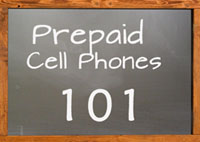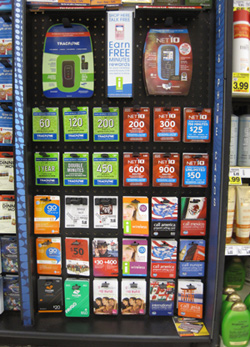Prepaid Cell Phones 101
Please Click!
 Ever wondered how prepaid cell phone service works? Here is the definitive guide to prepaid cell phones.
Ever wondered how prepaid cell phone service works? Here is the definitive guide to prepaid cell phones.
Prepaid plans can be absolutely confusing since the carriers have so many different types of plans, however they are really easy to understand once you understand a few key concepts.
Prepaid Vs. Contract
Prepaid plans differ significantly from contract plans.
- Prepaid Plans: you purchase your minutes before you use them.
- Contract Plans: you pay for your minutes after you use them.
Contract Plan Basics:
- Also called as post paid plans.
- You get a monthly bill for the minutes you use.
- Since you get a monthly bill, signing up for a post paid plan requires a thorough credit check and a contract with the cell phone company. The contract varies depending on your agreed upon minutes as well as your over the limit minutes which can sometimes cost you a lot of money if you’re not careful.
Prepaid Plan Basics:
- No bill, no credit check and no contract.
- It’s as simple as paying for the minutes before you consume them. Read more to find out just how beneficial prepaid plans can be for you.
Benefits of Prepaid Plans
Prepaid Plans are Cheaper
Prepaid plans can be MUCH cheaper than traditional contract plans. At one time they were more expensive, but a few years ago prepaid rates started coming down. Now they are cheaper than contract plans. For example, Straight Talk offers a 1000 minutes monthly plan for $30. Verizon offers a comparable contract plan with 900 minutes for $59.99. (That doesn’t even include the taxes and fees which will add an extra $15 – $20.) So Straight Talk prepaid service costs HALF as much as a comparable contract plan. Why do people still sign up for contract plans?
No Contracts, No Credit Checks
Traditional cell phone plans charge you for minutes after you use them. This is why they require a credit check and they make you sign a contract – to ensure that you pay your bill. If you don’t pay your bill, then they can report you to the credit agencies and ruin your credit. Also, if you try to leave a traditional contract plan before the end of your contract, the cell phone company will charge you a huge termination fee, sometimes as high as $300. If you don’t pay that then they report you to the credit agencies which will ruin your credit.
Prepaid cell phone plans don’t require you to sign a contract. There’s no credit check and you don’t need a contract since you pay for your minutes upfront, before you use them. If you use up your minutes before the end of your activation period, then you simply buy more – or not, if you don’t want to. You don’t have to buy more minutes. You can let your prepaid service lapse. You could also switch companies just as easily.
No Hidden Fees
With traditional contract plans, they publish one price, but when you get your bill you find it’s more than you were quoted. They tack on all kinds of obscure taxes and fees that typically add an extra $15 to $20 to your bill.
With prepaid plans, there are NO hidden fees. When MetroPCS advertises $40 unlimited service, you’ll pay $40 exactly. The only extra amount you’ll pay is if you purchase your minutes at a local retail store, in which case you’ll pay state and local sales tax on the purchase (which only adds a couple of extra dollars on the price).
Privacy
Prepaid cell phones offer privacy. We all know that today, cell phones have become personal tracking devices. Your location is tracked by the cell phone company. Your conversations are recorded. They even have the ability to turn on the phone’s microphone, even when the phone is off, and listen in on any conversations in the room.
Traditional cell phone plans require a credit check. To do a credit check they require one vital piece of information – your Social Security number. Once you purchase a traditional cell phone plan, your Social Security number, and therefore your identity, is tied to that phone. Any information that is collected from that phone is tied directly to your identity.
Prepaid cell phones, on the other hand, don’t require a credit check. You won’t be asked for your Social Security number to activate your plan. Most don’t even require your name. Your identity is not tied to the phone, so you can enjoy greater privacy with prepaid cell phones.
Many Ways to Pay for your Prepaid Cell Phones
Buy a Card
Most prepaid companies offer their minutes for sale on phone cards. You can purchase these cards at many retail locations like grocery stores, convenience stores, or big box retailers like Target and Walmart.
Pay Online
Many companies offer an online payment option. You’ll have to register with their website. When you need to purchase minutes, just go to that company’s site and pick out the amount of minutes you need and then pay with a credit card.
Automatic Billing
The majority of prepaid companies offer an automatic billing option. This is typically only available for monthly plans. You’ll have to set up this option and register a credit card. Every month, the company will automatically charge your credit card for the amount that you set up. This is the most convenient option, since you set it up once and don’t have to think about it. This is a great option if you know you’ll use the same amount of minutes every month.
So now you’re ready to switch to a prepaid cell phone let’s check out the different Prepaid Plans.
Types of Prepaid Plans
There are generally two types of prepaid cell phone plans: pay as you go plans and monthly plans. The difference in these two types of plans is the activation period.
Activation period -the amount of time you have before the minutes you purchase expire and your phone is turned off. You keep your phone activated by simply purchasing more minutes (airtime) at the end of the activation period. If you let your activation lapse, then many companies will give your phone number to someone else. There are generally no fees for letting your service lapse or reactivating your phone, however if you want to continue using your phone number and avoid the hassle of reactivating the plan, then simply keep your phone activated.
So the difference in the two types of prepaid plans is the length of the activation period.
Monthly plans are exactly what you think they are – plans with a monthly activation period. You purchase an amount of minutes, anywhere from say 100 minutes to unlimited minutes, and you can use those minutes for 30 days. At the end of 30 days they expire and you’ll have to buy more minutes to keep your phone activated.
Pay as you go plans are slightly different. They have varying activation periods. The typical activation period of a pay as you go plan is 90 days. You purchase a number of minutes, which again can be any number from 60 minutes to 1500 minutes, and then you have 90 days to use them.
Activation periods can vary, though. Activation periods can vary from as little as 30 days, all the way up to a year. Many times if you purchase a larger block of minutes, the plans come with longer activation periods. For example, TracFone offers 30 minutes of airtime that lasts for 30 days. Their largest block of airtime is a 1500 minute card which is good for 365 days. It really depends on the company and the variety of options that they offer.
Running Out of Minutes Before The End of the Activation Period:
For example, you purchased 500 minutes that were good for 30 days, but you used up those minutes in 20 days, then you have two options to keep your phone activated.
- Buy more minutes so that you can continue to make calls. Your phone’s activation period resets the day you add the minutes.
- Wait until the end of the 30 days and then purchase more minutes to keep your phone activated. Of course you won’t be able to use your phone until you add more minutes, but the plan won’t expire.
How to Get Started with Prepaid Cell Phones
- Check out the rest of our site. When you find a plan that fits your budget and suits your needs, then click on the link to go directly to that cell phone company’s website. You can buy phones and minutes on their website.
- Just a quick note, you’ll have to buy a new phone to start prepaid phone service. The cell phone companies don’t allow you to use your old contract phone with prepaid service, so be prepared for that.
How to use this site:
Here are 3 ways to compare prepaid cell phone plans:
- Compare Per Minute Pricing. When you know how many minutes of airtime a month you use, then check out these comparisons of 200, 500, 1000, and unlimited minutes plans. We’ve gone through every cell phone provider’s plans to see how much they charge at each of those levels.
- The Best Plans. If you have a certain use in mind for your cell phone, for example you need a cell phone for emergency use only, then check out the Best Plans section.
- Compare Individual Plans. If you have a particular cell phone company in mind, check out our detailed reviews of each company.

 If you are shopping for a prepaid cell phone plan, the enormous variety of plans can be absolutely confusing. Prepaid cell phones offer some clear advantages over traditional contract plans.
If you are shopping for a prepaid cell phone plan, the enormous variety of plans can be absolutely confusing. Prepaid cell phones offer some clear advantages over traditional contract plans.
 Hi, my name is Bill. I recently switched over to a prepaid plan, but when I started researching plans on the internet, I quickly realized that most of the review sites were total spam. I put this site together to help folks find the best prepaid cell phone plans.
Hi, my name is Bill. I recently switched over to a prepaid plan, but when I started researching plans on the internet, I quickly realized that most of the review sites were total spam. I put this site together to help folks find the best prepaid cell phone plans.